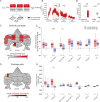Evidence for lateralization of fear emotions in the cerebellum
- PMID: 40447788
- PMCID: PMC12125079
- DOI: 10.1007/s00415-025-13183-0
Evidence for lateralization of fear emotions in the cerebellum
Conflict of interest statement
Declarations. Conflict of interest: The authors declare that the research was conducted in the absence of any commercial or financial relationships that could be construed as a potential conflict of interest. Ethical approval: Animal care and experimental procedures were performed in accordance with the European Communities Council Directive of 2010 (2010/63/EU) for care of laboratory animals and approved by a local ethics committee (Bezirksamt Arnsberg) and the animal care committee of North Rhine-Westphalia, Germany, based at the LANUV (Landesamt für Umweltschutz, Naturschutz und Verbraucherschutz, Nordrhein-Westfalen, D-45659 Recklinghausen, Germany). The study was supervised by the animal welfare commissioner of the Ruhr-University Bochum. Research involving human participants was approved by the local ethics committee.
Figures



References
-
- Adamaszek M, D’Agata F, Kirkby KC, Trenner MU, Sehm B, Steele CJ et al (2014) Impairment of emotional facial expression and prosody discrimination due to ischemic cerebellar lesions. Cerebellum 13:338–345. 10.1007/s12311-013-0537-0 - PubMed
-
- Batsikadze G, Diekmann N, Ernst TM, Klein M, Maderwald S, Deuschl C et al (2022) The cerebellum contributes to context-effects during fear extinction learning: a 7T fMRI study. Neuroimage 253:119080. 10.1016/j.neuroimage.2022.119080 - PubMed
Publication types
Grants and funding
LinkOut - more resources
Full Text Sources

